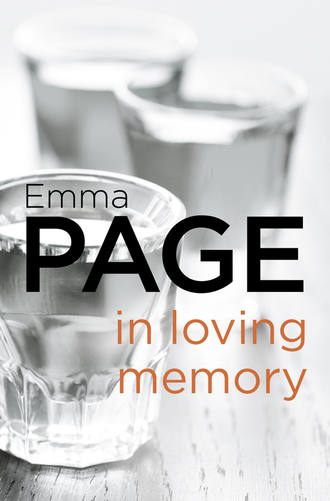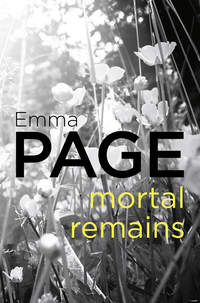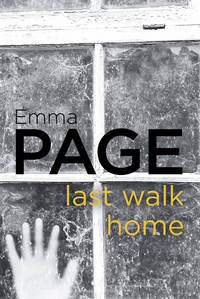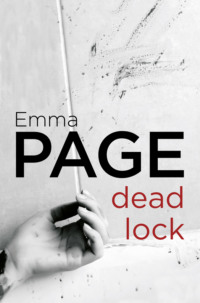
Полная версия
In Loving Memory
‘I’m not getting any younger, Princess,’ he said sadly. ‘And that’s an indisputable fact.’ Princess gave the plate one last appreciative dab with her tongue and then retired to the cushions to deal with her fur.
The kettle spouted steam towards the ceiling. Tim laid the cash-box tenderly down on the desk and went over to the stove. Hunger stirred sharply inside him again. He made the coffee, sat down at the table and tore open the packet of ham. Half-way through his meal he remembered the evening paper thrust into the pocket of his raincoat. He glanced idly at the headlines. Student unrest, somebody robbed, a controversial speech by a junior Minister.
He scooped up the odorous cheese on to a hunk of bread, turned the page and sat up suddenly, letting the piece of bread drop from his fingers on to the brown paper bag.
Carole! By all that was holy! Carole Stewart, staring out at him from a wedding group! Men in morning dress, tall broad imposing-looking men with an air of solid wealth. Slender women in silk suits and airy hats of puffed organza, fragile girls in drifting high-waisted dresses. The bridegroom no longer in the first gay flush of youth – thirty, thirty-five perhaps – a good-looking man with a figure already bidding good-bye to slimness, an air of well-founded prosperity, of mellow country houses, a London flat with a good address.
‘Carole Stewart,’ he said aloud with a note of brooding. So this was what had become of her! He’d often wondered. There had been a good many girls in the last eight years. Tall and short, plump and slender, dark and fair, never any shortage of companions to share the sardines and the rough red wine. He could hardly remember their names, their faces, their taste in cigarettes.
But he remembered Carole. Oh yes, he remembered Carole Stewart all right. When she had swept up her belongings into a fibre suitcase, tired of hand-to-mouth living, the unruly disorder of the studio, when she’d grabbed her coat and stormed down the stairs after their final and most spectacular row, he’d wandered the streets for days, looking for her in coffee-bars, in lodging-houses, among the open-air stalls of the street markets. But he’d looked without success.
‘I’m getting out!’ she’d cried. ‘I’m going to make something of my life, I’m going to know where next week’s rent and tomorrow’s meals are coming from! You can stay here and rot, Tim Jefford, but I’m pulling out while there’s still time!’
He jerked his thoughts back from that tempestuous evening two years ago and began to read the paragraphs under the wedding-group. Some old man, Henry Mallinson, some well-heeled tycoon with a string of garages defacing the broad acres of England, had suffered some kind of heart attack. There he was, on the left of the group, at the wedding twelve months ago of his younger son, David, to Miss Carole Stewart.
Tim raised his head. So she’d embarked on a new life after all, a good life, the life of country houses unshakeably reared on a foundation of petrol pumps and motor-sales. He dropped his eyes again, seeking the address.
Whitegates, a good name for a house, a reassuring name with its implications of rolling parklands, of sinewy sons of the soil bedding out plants in the herbaceous borders.
He drank the last of his cooling coffee at a single gulp and stood up. He paced about the cluttered studio, assessing the information and its possibilities.
‘You’ve done well for yourself, Carole old girl,’ he said with affectionate admiration. Might there not be a little to spare for an old and intimate friend, might there not be a little handout – or not such a little handout – a good fat handout, in memory of old times?
He flung himself down on the sofa and screwed up his eyes in concentrated thought. Mallinson – he’d heard of the old man, he’d seen bits about him in the paper now and then. Gave money to charities, didn’t he? Fulminated sometimes about the decline in moral standards, loudly and publicly regretted the disappearance of the old virtues. Tim examined the photograph again with care, searching the lines of Henry Mallinson’s face for clues to his character.
A hard face, the face of a man with strong and rigid views, a man who would stand no nonsense, a man who liked his own way and was accustomed to getting it. A man who would lend his presence to the wedding of his younger son only if that son had seen fit to marry a girl his father approved of, a girl who would do credit to the family name.
A heart attack. Mild enough, apparently, but Mallinson was an old man, the attack might be the first of many, death might be raising the first beckoning finger. There was a large fortune to be disposed of, there would be a will, there would be the sharing out of property, of huge and glittering assets.
Tim stood up again, feeling excitement, exhilaration beginning to flow through his limbs. This was precisely the moment to pay a visit to dear Carole, exactly the moment at which she would most earnestly desire the long shadows of the past to dissolve and vanish for ever, so beautifully and rightly the moment at which she would be prepared to dip her pale and pretty hand into her well-padded wallet and pay tribute to an old and well-loved friend.
He pulled open the bottom drawer of the bureau and took out a bunch of letters secured with an elastic band. Carole’s letters, written during one of their stormy separations, kept out of sentiment. He slipped off the elastic band and drew a letter from its envelope, running his eyes over the pages with satisfaction. She’d let herself go in the letters, hadn’t minced matters. Not at all the kind of letters a tycoon’s daughter-in-law would care to see produced in her elegant drawing-room.
He began to hum a little tune. All he needed now was a cover-story, a good excuse for a visit to Rockley.
The final lines of the newspaper story gave him his cue. Among his many and varied interests Mallinson apparently numbered a passion for old coins. His collection was among the finest in the country, he had made a particular speciality of Roman coins. Tim grinned with pleasure at his own ingenuity.
One good rarity, surely he could lay hold of one decent Roman coin with twenty-five pounds? One flawless specimen and he was in business as a dealer. He frowned suddenly, biting his lip in agitated thought.
He’d need money for the train-fare, money to stay somewhere near Whitegates for a day or two – the village pub perhaps? Money for some presentable clothes. How much would be left when he’d bought that coin? He hadn’t the faintest idea how much it would cost, whether anything at all would be left, whether in fact the whole twenty-five pounds might not even be enough to buy the coin, let alone leave anything over for the other expenses.
He banged his palms together. He could dispense with the notion of buying a train ticket, he could thumb a lift as he’d done countless times before. He could borrow a respectable suit from one of his cronies, beg a suitcase from another. That left only the money for the pub. How long would he need to stay in the village – what was the name? Rockley, that was it. They wouldn’t be likely to charge much in a place like that. Bed and breakfast, he could get by on that. He’d made do with one meal a day before now, with no meals a day often enough. You could stoke yourself up on a good pub breakfast with enough calories to keep you going all day.
He looked round the room, his eyes searching for saleable goods, for anything that might fetch a few shillings. The transistor radio – he could do without that. If his gamble came off he could buy himself a dozen radios. The easels, they’d fetch a bob or two. And of course the coin might only cost a few pounds, he might not have to sell anything at all.
Too late to do anything tonight. Frustration stabbed at him but he brushed it aside. First thing in the morning he’d be down at the shops looking for his coin, then he’d have to make a round of his mates to collect the clothes and the suitcase. The afternoon should see him on the way to Rockley. But no – why spend tomorrow evening in the Rockley pub, paying out good money when the day would be already nearly over, useless to him? Sleep the night here in the studio, start out the following day at the crack of dawn, thumbing a lift from the early lorries, get to Rockley before the morning was well advanced, that would leave him the rest of the day to pay his calls. With any luck he might finish his business before the day was out, might not need to spend a single penny on a night’s lodging.
The Siamese cat sprang down from the sofa and rubbed herself against his leg. He glanced down at her, stooped and picked her up, burying his cheek in the soft fur.
‘Can’t let you starve while I’m gone, Princess,’ he said. ‘When I get back there may be salmon and cream for you, but in the meantime—’
In the meantime there was Hilda Browning, tap-tapping at her hopeless novel on the floor below.
‘Come on, Princess!’ He went rapidly from the room, down to Hilda Browning’s door and rapped loudly.
‘Open up, Hilda! It’s me, Tim!’
The typewriter keys rattled to a halt. Footsteps inside the room, the door flung open and Hilda Browning smiling at him with sudden renewed hope.
‘Tim! It’s been ages—’ Ages since he’d banged on her door, ages since their brief flare of affection had fizzled out into darkness. ‘Come in!’ She threw the door wide open.
‘I have to go away for a day or two,’ he said, stepping inside. ‘On a matter of business. Would you do me a favour?’ He threw her his most winning smile with the charm turned full on. ‘Look after Princess for me while I’m gone? I’m leaving the day after tomorrow, very early. I’ll make it up to you when I get back.’ He kept his smile going at full beam. But Hilda didn’t even pause to consider the matter.
‘Of course I will!’ she cried. ‘I’d be glad to, you know that! Bring Princess down tomorrow evening. She’ll be quite at home here.’ She ought to be, Hilda thought with a fleeting thrust of nostalgia, she spent most of her time down here a few months ago. She stretched out a hand and stroked the cat’s fur. ‘I’ll take very good care of her.’
Tim began to edge his way back towards the open door.
‘I knew I could rely on you,’ he said, allowing his face to glow with gratitude. ‘Thanks, Hilda, I won’t forget.’ He let his eyes send out a beam of promise. ‘I think I’ll have something to celebrate when I get back. You can help me to celebrate.’
Another minute or two of rather fatiguing encouragement and radiant goodwill and he was able to make his escape back to the studio. He dropped Princess on the sofa, picked up the newspaper and with great care tore out the half-page to be folded away safely in his pocket. He dropped a kiss on the demurely smiling features of Carole Stewart, now Carole Mallinson of happy memory.
‘Get out the champagne, Carole, my love!’ he said. ‘Old Tim’s riding into town!’
CHAPTER 3
BREAKFAST TIME at Tall Trees. Fragrant coffee in a silver pot, hot rolls in a napkin-lined basket, delicate whorls of creamy butter in a crystal dish. The uniformed maid lifted the cover from the platter of bacon and kidneys. She left the room, closing the door behind her with well-trained noiselessness.
‘I don’t want any of that.’ David Mallinson frowned at the succulent kidneys. ‘I’m not very hungry.’ He took a roll and broke it in two. ‘I didn’t sleep very well.’
‘I slept like a log.’ Carole Mallinson had acquired that knack in the grim days, when she’d been Carole Stewart, she’d learned that sleeplessness didn’t help. Whatever disasters the morning might see fit to bring, it was better to meet them rested and refreshed. It was just a trick, really, you closed your eyes and switched off – pouf! like a bright light being extinguished, you sank down, down into the pit of unconsciousness where there was no yesterday and no tomorrow, no ambitions, no memories, no hopes, no fears.
‘I thought Father looked surprisingly well yesterday evening,’ she said. ‘I think he’ll start getting up for a little while in a day or two. He can’t bear staying in bed.’ She had started calling Henry Mallinson Father as soon as the wedding-ring was safely on her finger. No father of her own, it gave her a feeling of security, of background, to use the name. And the old man liked it, she knew that. Such a pleasant, unspoiled girl, his son’s wife – she was aware of the regard in which he held her – so refreshingly unsophisticated and uncalculating in this day and age.
David glanced at the small French clock on the mantelshelf.
‘Kenneth will be arriving some time this morning.’ It wasn’t anxiety for his father’s health that creased David’s brow into deep lines. The old man had the constitution of an ox, it would take more than a heart spasm to finish him off or even keep him out of action for more than a day or two. It was the thought of his elder brother walking up the curving staircase at Whitegates that took away his appetite, the prodigal son come home again – to what? To the fatted calf, reconciliation, the old man’s will changed, his fortune sliced in two instead of being delivered whole into the hands of his younger son, the one who had faithfully stayed at home, who had run the business, had taken care in the whole of thirty-eight years of living, never once to cross swords with his father, knowing even in childhood on which side of his bread the butter lay?
Carole ate her bacon and kidneys with relish. ‘I would have expected Kenneth to drive down immediately, as soon as Doctor Burnett phoned,’ she said. ‘He’s certainly taking his time.’
David shrugged. ‘Some business matter, some meeting he couldn’t postpone, apparently.’ Kenneth was doing well by all accounts. A busy man couldn’t just drop everything and jump into his car, however urgent the summons.
‘Then I don’t imagine he’ll be staying very long,’ Carole said soothingly. ‘If he’s as busy as all that.’
‘No, perhaps not.’ David crumbled his roll moodily. Long enough though, Kenneth would spare a day or two all right as soon as he got wind of the solicitor being sent for, a new will being drawn up. He pushed his cup forward. ‘More coffee, please.’
Carole lifted the silver pot. ‘I take it he’ll be staying at Whitegates?’
David jerked his head round. ‘Why yes, of course. Where else would he stay? Not here, surely?’ The two brothers had never got on well together, not even as small boys. There had always been the twin swords of jealousy and resentment between them.
‘Well, no, not here.’ It hadn’t even crossed her mind that Kenneth would think of staying at Tall Trees. It would have been too difficult, the atmosphere too charged with tensions, with all the long hostilities of boyhood and youth that might explode into the fierce quarrels of grown men. ‘But I thought perhaps one of the Hallborough hotels. It might be awkward up at Whitegates, a visitor, with illness in the house.’
David set down his cup with a tiny clatter. ‘Kenneth is hardly a visitor. And they can cope at Whitegates, there’s staff enough up there to cope with a dozen visitors.’ He picked up a fragment of his bread roll and smeared it with butter.
‘Mother always liked Kenneth best,’ he said abruptly, taking Carole by surprise. David hardly ever mentioned his mother to her. Dead these ten years or more, closing her eyes and letting herself drift out of life after a minor illness, her painted likeness still hanging in its great gilt frame over the fireplace in the entrance hall at Whitegates, the calm, disciplined, beautiful, unhappy face turned a little to one side, the wide thoughtful eyes looking back into the past, at the memory of pain.
‘Does it matter now?’ Carole asked sofly. ‘You’re both grown men.’ Almost middle-aged, she added in her mind. Surely swept by the maturing years to some point beyond childish jostlings for position?
‘Of course it matters,’ he said, astonished at her lack of perception. It would always matter, now when they were middle-aged, in thirty years’ time when they were old. The passage of time might erase many things but not that, never that. His mother’s eyes going first to Kenneth when the two boys came together into the room where she sat by the window, the tiny habitual difference in her tone when she spoke to her elder son, her first-born.
‘I’ve thought once or twice lately,’ Carole said, playing with a spoon, ‘that your father’s developed – I don’t know – some little oddnesses. He seems to be growing old quite suddenly.’ She raised her eyes to her husband. ‘I imagine he’ll get over this attack – and pretty quickly – but I wonder …’ She didn’t finish the sentence, but it finished itself in both their minds. I wonder just how long he will last? Will there be a second attack? A third and perhaps a final one? And before too long?
‘Oddnesses?’ David said sharply. ‘Exactly what kind of oddnesses?’
‘He’s got rather strange about money, for one thing.’
‘He was always careful about money.’ Not mean, but careful, everything accounted for, no waste, no pretentious lavishness. Solid comfort, good value in return for cash laid out – but never stingy.
‘I don’t mean that, I mean the way he’s taken to keeping a little hoard of money in his bedroom. He never used to.’
‘I didn’t know he was doing it now.’
Carole pleated a fold in the crisp damask of the table cloth, looking down idly at her fingers in their meaningless task.
‘Quite a lot of money, in notes.’ She smiled. ‘He has an old-fashioned cash-box. I saw it a few weeks ago, I called in to see him one morning, he was rather tired, he was having breakfast in bed.’ The first signs of advancing age, that. He’d have been appalled at the notion of breakfast in bed only a couple of years ago. ‘He was counting the money, fivers mostly.’ She looked up and smiled again. ‘Just like a miser in a storybook. He snapped the box shut as soon as I came in. He pushed it into the drawer of the bedside table, but I saw it all right.’ She stood up. ‘And the housekeeper was complaining to me that he’d taken to querying the domestic accounts in a way he never used to. Saying they were ordering too much milk. Silly little things like that.’
David got to his feet. ‘I shouldn’t think it’s of much consequence. An old man’s fancy. People do have funny notions when they get old. It’s only to be expected.’
‘Hardly a good idea, though,’ she said. ‘All that cash. With servants in and out of the room. And that secretary, Gina Thorson …’ She let the little implication lie there. A hundred pounds, forty pounds, even twenty or ten, might represent temptation to a girl like Gina Thorson.
Carole’s practised eye had assessed Gina and her possessions when the girl had first arrived at Whitegates, recognizing from harsh experience the signs of skimped means, the striving after an appearance of well-kept respectability, the cheap smart clothes, shoes and handbags designed to imitate leather.
David raised his eyebrows. ‘Gina’s all right. She wouldn’t take anything she wasn’t entitled to.’ He lost interest in Gina Thorson and what she might or might not feel herself entitled to. He let his mind slip back to its major preoccupation. ‘Do you think we should ask Kenneth to dinner this evening?’
She pondered the delicate question. Would Kenneth wish to dine with them? Would he prefer the quiet of a Hallborough hotel? Or to take a meal in solitary state at the long polished table in that great shadowy room at Whitegates? Or not a solitary meal perhaps, Gina Thorson might be there, smiling at him above the gleaming glasses and the glittering silver, leaving Dr Richard Knight to his own devices for once.
‘I don’t know. Perhaps we’d better leave the first move to Kenneth. See if he calls here to see us, if he’s willing to be friendly.’ She’d never met Kenneth. He hadn’t come to their wedding, although a formal invitation had been sent to him. He’d despatched a present with a printed card enclosed in the wrappings, a present that could be displayed with all the others, an expensive, carefully-chosen present, a set of handsome Venetian goblets. Family enmities need not be made plain to the prying eyes of outsiders.
‘If he’s willing to be friendly?’ David echoed. ‘I’m not sure I’m willing to be friendly with him.’ Packing his bags and slamming out like that, leaving David to cope with the family business as best he could. One didn’t forget things like that in a hurry. Nor the long hostilities of childhood, the twisted tangles of emotions. They weren’t to be dissolved all in a moment by a knock on the door, an impersonal smile, a ritual meal eaten together.
‘See how it goes,’ Carole said, willing as always to bend to the exigencies of the moment, ready to trim her sails as expediency demanded.
David glanced at his watch. ‘I must be going. I’ll just call in at Whitegates, see what kind of a night Father had. I don’t suppose he’ll want to see me at this hour. Then I’ll go on to the office.’ Rather a grand building in Hallborough these days, the main offices of Mallinson’s, a far cry from the single room in a back street fifty years ago. ‘I don’t know what time I’ll be home this evening, I’ll try not to be too late.’ Old men might weaken and grow ill but the business had to be kept running smoothly, Henry Mallinson would have been the first to acknowledge that.
‘Suppose Kenneth calls here before you get back?’
‘You’ll just have to play it by ear.’ He could trust Carole to do that. She would handle the situation as well as he could himself, better actually, if he were to be honest. She had an instinctive knack of saying the right thing at the right time.
‘I’m leaving in five minutes,’ Kenneth Mallinson said into the phone. ‘I spent a couple of hours last night going into the figures.’ Up till four o’clock in the morning, staring at the wretched figures, if the truth were told, but one didn’t need to tell one’s junior partner everything. ‘And I’ve decided to hang on for a little while longer, I think I may be able to raise some more capital.’
‘Just how long is a little while?’ The junior partner knew better than to ask Kenneth Mallinson exactly where he proposed trying to raise twenty thousand pounds. If the information weren’t volunteered in that first moment, a direct question wasn’t going to elicit it.
‘Two or three weeks, less perhaps. I can let you know in a day or two.’
When he gets back from Rockley, the junior partner thought, after he sees his ailing father. Was he proposing to approach the old man for a loan? Hoping for a death-bed reconciliation? Something of that kind? He might pull it off of course. One never knew with families. It might be possible.
‘About that job I’ve been offered,’ he said. ‘They’ll want an answer in a few days.’ All things being equal, the junior partner would much prefer to stay on in business with Kenneth Mallinson. But if the firm was on the verge of bankruptcy he’d be glad of the job. Quite a good opening really.
‘I’ll let you know,’ Kenneth said. ‘You can stall them for a day or two.’
‘What do you want me to do while you’re away?’ the junior partner asked. ‘Go round to the bank and try to talk the manager into giving us more time?’
‘Yes.’ Quite good at that, the junior partner, better than Kenneth Mallinson, who found it hard to go cap in hand to any man. ‘Tell him I’ll be in touch with him in a day or two.’
‘Right you are. I hope you find your father on the road to recovery.’ Though was that what his senior partner wanted? Would it not in many ways be more convenient if he found his father on the point of death? With just enough remaining strength to put his signature to a cheque, to summon his solicitor to draw up a new will?
‘I don’t think he’s all that ill,’ Kenneth said. ‘From what Doctor Burnett told me. You can phone me at the local pub, Rockley village that is, the Swan, if you need to get in touch with me urgently.’
‘You’re not staying at the house then?’ Surprise in the junior partner’s tone.
‘No, they won’t want to be bothered with extra work just now. It’ll be more convenient for them if I get a room at the pub.’
And more convenient for you as well, the other man thought, smiling wryly to himself. No one to overhear your phone calls, no one to realize just how rocky our finances are at this moment.








